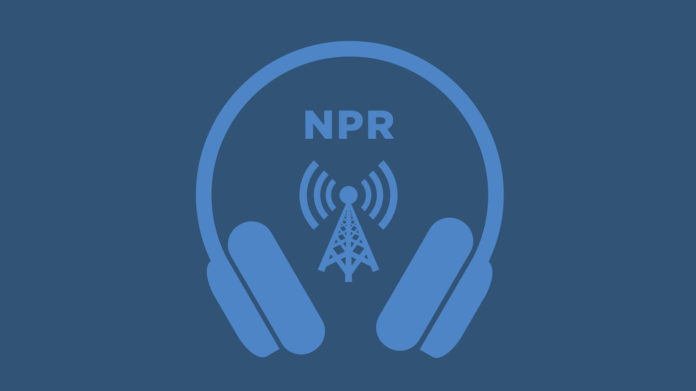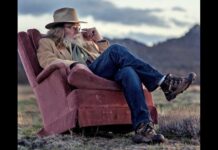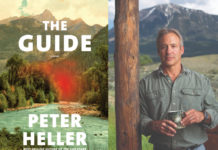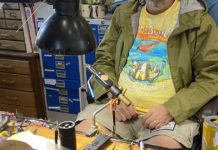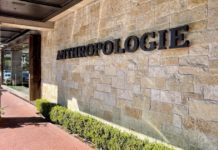MELISSA BLOCK, HOST:
For the new PBS TV series “America Outdoors,” Baratunde Thurston cowboyed up in Idaho.
(SOUNDBITE OF TV SHOW, “AMERICA OUTDOORS WITH BARATUNDE THURSTON”)
MARTIN BLACK: We’re going to get you dressed.
BARATUNDE THURSTON: I thought I was dressed, but this…
BLACK: Now, well, this is real cowboy stuff.
BLOCK: He whitewater rafted in Appalachia.
(SOUNDBITE OF TV SHOW, “AMERICA OUTDOORS WITH BARATUNDE THURSTON”)
THURSTON: Let’s get wet.
UNIDENTIFIED PERSON: You ready?
THURSTON: Yes.
UNIDENTIFIED PERSON: Let’s go rafting.
THURSTON: (Laughter).
BLOCK: And he hiked to a waterfall – yes, a waterfall – in Death Valley.
(SOUNDBITE OF TV SHOW, “AMERICA OUTDOORS WITH BARATUNDE THURSTON”)
THURSTON: That is so beautiful.
BLOCK: He canoed, fly-fished, ran alongside an ultramarathoner, and snorkeled to explore a Civil War shipwreck. When he’s not doing all that, Baratunde Thurston is a writer and comedian. He is the author of “How To Be Black” and the host of the podcast “How To Citizen With Baratunde.” And he joins me now to talk about his travels as host of “America Outdoors.” Welcome to the program.
THURSTON: It’s so good to be here with you, Melissa. And when I hear you recount all those activities, I feel rather exhausted, so thanks for that.
BLOCK: (Laughter).
THURSTON: I was like, oh, yeah, I – fly fishing. I forgot about the fly fishing (laughter).
BLOCK: Well, of all of those adventures – and we only named a few of them – which one pushed you most outside of your comfort zone?
THURSTON: Ooh. Physical comfort zone was most challenged by Idaho, by a man named Martin Black, who had me on a horse all day – a horse I’ll never forget. What’s up, Spider (ph)? How you doing? And my various muscles I’m not used to feeling, I felt them the next day.
BLOCK: We should explain that the series is not “Baratunde’s Excellent Adventures” even though they’re really fun.
THURSTON: I think it could be, yeah.
BLOCK: But it’s a series with a throughline about how our relationship with a place, with the outdoors – how it shapes who we are and how we see ourselves. What did you learn about that from all of the people you met around the country?
THURSTON: I mean, I learned that everyone can be outdoorsy. I learned from the oldest Americans to the newest. I got to spend time with three different Indigenous nations as a part of making this show. And I got to spend time with teenage refugees who are brand-new to the country and using hiking and outdoor activities to feel more at home. And so it was really beautiful to connect with folks who had such deep connections to the outdoors and got so many different things out of it. Sometimes, it was emotional healing. Sometimes, it was political activism. Sometimes, it was a job. Sometimes, it was exercise.
BLOCK: When you mentioned emotional healing, are you thinking of…
THURSTON: Yeah.
BLOCK: …One character in particular?
THURSTON: I’m thinking of many characters. I’m thinking of one place. I went to the Great Dismal Swamp, which borders North Carolina and Southern Virginia. And this is a place that was 2,000 square miles around the founding of this country, a place that – George Washington was a member of a corporation and had a goal of draining the swamp – that was a literal thing before it became a political metaphor – and monetizing the swamp with, of course, enslaved labor.
Because the swamp was so impenetrable and difficult to tame, it became a safe place for people fleeing that slave economy. And 50,000 Black folk passed through there over about a century, living in marooned colonies built upon the former settlements of Indigenous people. And it’s nothing I anticipated making the show. I anticipated sweat. I anticipated whoops. I did not anticipate a deep, emotional connection to my own ancestors. That was very emotional.
BLOCK: One of the ideas that you keep coming back to throughout the series is, who is the outdoors for? Who gets to enjoy these wild places? And I’m thinking of one of the episodes when you go birding in northern Minnesota with a nature photographer, an African American nature photographer named Dudley Edmondson.
(SOUNDBITE OF TV SHOW, “AMERICA OUTDOORS WITH BARATUNDE THURSTON”)
THURSTON: So I’m going to ask you a very direct question, Dudley.
DUDLEY EDMONDSON: Yes, sir.
THURSTON: Black people, where are they?
EDMONDSON: Yeah, they’re not here.
THURSTON: (Laughter).
EDMONDSON: Yeah, so…
BLOCK: You’re laughing, Baratunde, as you listen to that.
THURSTON: Yeah.
BLOCK: And you’re laughing in that scene. But what does that say to you – Black people, they’re not here?
THURSTON: Yeah. I think this show helped me really understand the full complexity of Black Americans’ relationship with the outdoors. And it is very complex, and it’s very deep. The outdoors was the scene of the crime for us. It’s where we were forced to labor. It’s where we were separated from our families. It’s where we were tortured. It’s where we were killed. And then, even upon supposed emancipation, it’s where we were terrorized and lynched, and a lot of our blood is in that soil. And even when we were supposedly free after that, it’s where we were denied access to public parks and public pools even though our tax dollars were definitely funding them as well.
So it is super simplistic to say or ask, how come Black people don’t swim? You know, how come Black people don’t do outdoors things? Even amongst the Black community, we have this internalized we-don’t-do-that. But many of us do. And I met people like Dudley who also described what nature can provide, which is a sense of belonging, a sense of peace. Nature doesn’t abide supremacist views of race. Yeah, that’s just not how it operates. And so there is real freedom to be found there.
And I found that with Dudley. I found that with this surfing network called Color the Water in the Los Angeles area where I surfed with way more Black people than I’ve ever surfed before in my life. It felt like Wakanda on the waves.
BLOCK: (Laughter).
THURSTON: So yeah, Black people – it turns out we are out here.
BLOCK: You know, the places that you go in this series are so breathtakingly beautiful. At the same time, they’re – a lot of them are threatened in various ways whether it’s climate change…
THURSTON: Yeah.
BLOCK: …Or sprawl or population growth. What sorts of solutions were you hearing from people? Or what are the tensions that you were exploring here?
THURSTON: A lot of solutions, a lot of tensions. I mean, the LA River right in my new backyard – I’m kind of new to LA – that was a big eye-opener for me, the fact that you had citizen-activist residents fighting to designate this an actual river.
I was moved by the time I spent with Indigenous people, and I think one of the more emotional experiences I had was with the Shoshone-Bannock in Idaho. We were supposed to accompany them on a traditional salmon hunt, and they basically called off the hunt because there weren’t enough salmon. And they said, you know, for thousands of years, these salmon took care of us and helped us survive. Now, it’s our turn to help them. And so they’re mobilizing to protect resources.
Everywhere I went, there were folks doing that. In a time when we’re getting a lot of decisions from on high in this country that make us feel like people are trying to accelerate our path toward doom, there are people literally on the ground doing the opposite. And we can plug in and support them and build this better future from the ground up.
BLOCK: You mentioned in one of the episodes that it was your mom who introduced you really to the outdoors early on.
THURSTON: Yeah.
BLOCK: How’d she do it?
THURSTON: I grew up in Washington, D.C. – very much in the city, but also very close to public parks. My mother would just say, go outside. She was a big fan of road trips – ’cause that was the affordable way to travel – and camping ’cause that was the affordable lodging. We’d visit state parks and national parks. And she loved birds. I managed the family bird feeder. Every morning, I’d have to change this poop water for these birds.
(LAUGHTER)
THURSTON: And so vast adventures, but also very local adventures. That was one of the big inspirations for doing this show, was to reconnect with the kid in me who visited Kitty Hawk, reconnect with the kid in me who used to hang out in the Blue Ridge Mountains. And I got to do that. So there was emotion. There was reclamation. And it was fun. You know, kids, like, find a way and use our imaginations. And then, we become very serious as adults, and the world becomes weighty. And nature can carry some of that burden if we share it lovingly and respectfully as my mother did with me.
BLOCK: That’s Baratunde Thurston. His new series, “America Outdoors,” premieres July 5th on PBS. Baratunde, great to talk to you. Thank you.
THURSTON: You, too, Melissa. Thank you so much.
(SOUNDBITE OF THE SEA AND CAKE SONG, “FOUR CORNERS”)
Copyright © 2022 NPR. All rights reserved. Visit our website terms of use and permissions pages at www.npr.org for further information.
NPR transcripts are created on a rush deadline by an NPR contractor. This text may not be in its final form and may be updated or revised in the future. Accuracy and availability may vary. The authoritative record of NPR’s programming is the audio record.
Credit: Source link

















